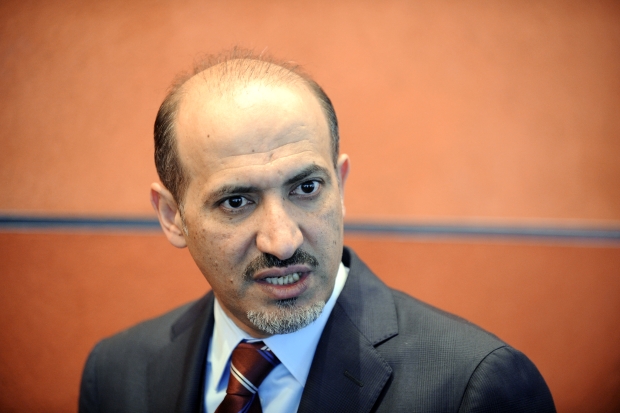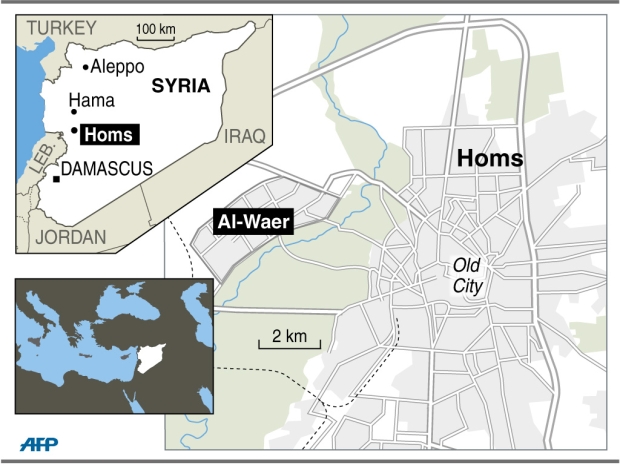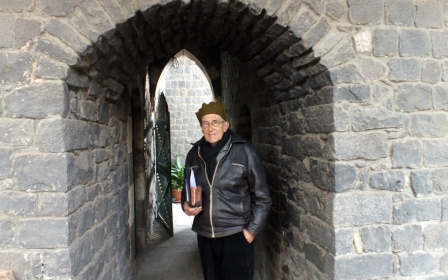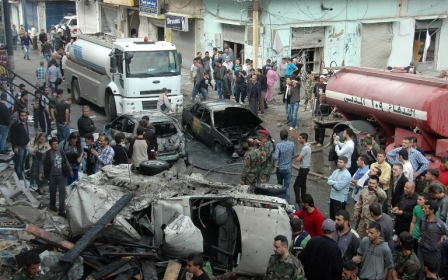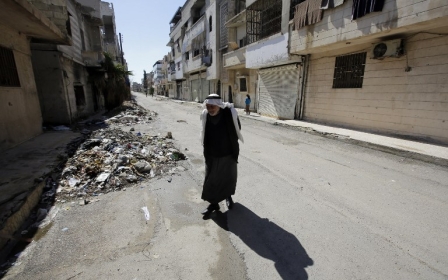Withdrawal from Homs 'is not the end of the world' says Jarba
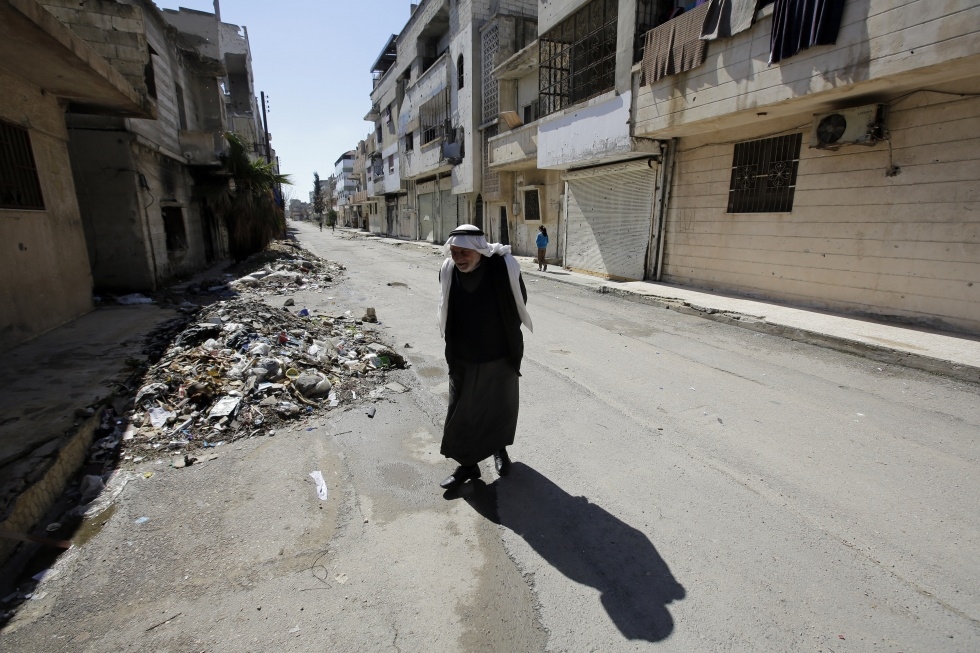
Syrian National Council President, Ahmad Jarba, vowed to keep fighting on Wednesday, stressing that the war could still be won despite today’s evacuation of rebel-held Homs.
“It was important for us at this point to preserve their lives,” Jarba said while addressing the US Institute of Peace, an independent Washington-based think tank.
Some 2,000 civilians and fighters were evacuated from Homs on Wednesday as part of a deal brokered with government forces that have been besieging the city for over a year and a half.
Homs was seen as a rebel bastion and dubbed the "capital of the revolution" which broke out in 2011.
But Jarba stayed firm insisting that the withdrawal “is not the end of the world” and that the civilians and fighters have been allowed to return to opposition controlled areas.
“God willing, with their endurance they will regain the city,” he added.
Jarba arrived in the US on Monday for a ten-day visit, his first official trip since the SNC was formed in 2012.
The SNC president is expected to use the trip to try and persuade the US to step up support for the opposition and in particular to officially start arming opposition forces with heavy duty weapons, such as anti-aircraft missiles.
The visit comes as the US said it would grant diplomatic status to Syrian opposition offices in Washington and vowed to step up non-lethal aid to the mainstream opposition group.
“For us it is not only about gaining or losing a city, but the whole conflict,” Jarba said. “Even if Homs is completely controlled by the opposition no one will be secured” because they will still be targeted “by barrel bombs, air raids and missile strikes.”
Despite the UN Security Council condemning the use of barrel bombs they have been used to devastating effect across Syria, including in Homs and Aleppo in the north.
Homs withdrawal under way
Homs was once home to 800,000 people and was seen to be broadly representative of Syria’s sectarian patchwork. Peaceful protests that erupted against the rule of President Bashar Assad in 2011 were quickly put down by force, actions which quickly escalated the fighting on both sides.
While rebel forces managed to seize large parts of the city in 2011, by early 2012 Assad’s troops had launched a major offensive to retake it, which allowed them to recapture large swaths of Homs, although not the Old City that remained in rebel hands until today.
Evacuation of the remaining Homs civilians and fighters started from around 10 am local time (8am GMT) when the first evacuees could be seen boarding the fleet of green government buses. Rebel fighters were seen to be carrying light weapons, supplies and other equipment, while Syrian army and police oversaw the withdrawal and a white UN car monitored the operation.
According to the Syrian Observatory for Human Rights, a Britain-based monitoring group, only about a third of the withdrawal has been finalised so far, with further rounds of evacuations scheduled for tomorrow.
The Observatory's Rami Abdel Rahman said the withdrawal was "a propaganda victory for the regime, because Homs holds a symbolic place in the Syrian revolution."
He also told AFP "the resistance [by Homs' rebels] was legendary, despite two years of siege, and in spite of this, the international community did nothing."
The city is seen as strategically important and rests on the main highway between the capital Damascus, which has largely remained under Assad’s control, and the Mediterranean coast.
Despite this, Jarba remained firm and tried to allay fears that the Assad regime, which had once been perceived to be on the retreat, had succeeded in turning the tide of war.
“As for the situation on the ground it is not as bad as some believe despite everything that has been happening in Homs ... In Deir Ezzor in Idlib and Aleppo on the coast the opposition is gaining ground,” he said.
“God willing we will be able to win many of these battles as we did [previously] but the main problem remains the air force that is making the life of the Syrians a nightmare.”
US support for opposition
Opposition forces are now once again asking for weapons that will better equip them against aerial assaults and allow them to “change the balance of power on the ground.”
“When the balance of power changes this will allow for a genuine political solution,” said Jarba. “This is the plan for the opposition. This is not war for the sake of a war.”
The opposition and the government took part in two rounds of UN-sponsored talks in Geneva, although the latest round collapsed earlier this year without a deal.
Jarba is now urging the US to take the helm of any future mediation efforts and to apply further pressure on the Assad regime to step down.
While the US has long tentatively backed the rebels, the prominence of extreme al-Qaeda and ISIL fighters caused the West to cool its support and withhold key military supplies.
Assad has also used the threat of extremism to bolster his camp, claiming that his forces are fighting to protect religious minorities and are acting as bulwarks against extremism.
But Jarba vehemently denied any links to ISIL and said that his fighters were actively fighting against these elements in the east of the country, instead blaming Assad for promoting Sunni extremism.
“We are part of the core of the Syrian people. Terrorism is the product of the [Assad] regime,” Jarba said. “Americans have seen that first hand in Iraq when Bashar sent al-Qaeda operatives to blow up US soldiers on the streets of Iraq. Al-Qaeda now exists in Syria because the regime took it out of prison to control its people.”
Jarba added that: "We need effective, efficient weapons...and we commit to keeping them in the right hands...professional hands."
He also stressed that the SNC and its allied fighters respected all minorities and had not engaged in ethnically inspired violence that has marred much of the bloody conflict, now in its fourth year.
By the latest estimates more than 150,000 people have been killed and millions more displaced in the fighting.
Assad is planning to hold elections next month, despite repeated warnings from the opposition and the UN that this would gravely undermine and future talks. He is widely expected to win the vote, with opposition candidates largely barred from standing due to residency requirements that target the foreign-based SNC.
Middle East Eye propose une couverture et une analyse indépendantes et incomparables du Moyen-Orient, de l’Afrique du Nord et d’autres régions du monde. Pour en savoir plus sur la reprise de ce contenu et les frais qui s’appliquent, veuillez remplir ce formulaire [en anglais]. Pour en savoir plus sur MEE, cliquez ici [en anglais].


